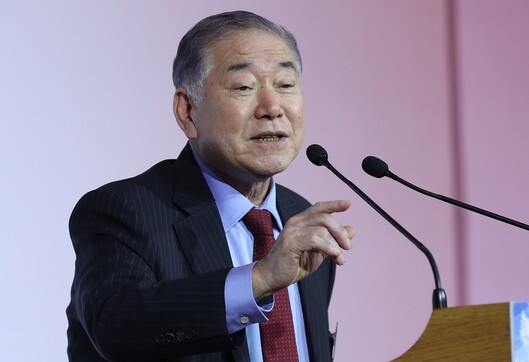hankyoreh
Links to other country sites 다른 나라 사이트 링크
“Bold new approach needed to resume stalled talks between US and North Korea”

“If easing sanctions can only be at the exit [of the North Korea denuclearization roadmap] and not at the entrance, we need a bold new approach where the establishment of diplomatic relations between the US and North Korea or the signing of a non-aggression treaty are placed at the entrance in exchange for denuclearization in the North.”
Speaking at the 5th Symposium on Korean Peace, “A new Korean Peninsula regime of coexistence and shared prosperity,” hosted by Yonhap News on June 27 at Lotte Hotel in the Sogong neighborhood, of Seoul’s Jung (Central) District, Moon Chung-in, special presidential advisor for unification, foreign affairs and national security, pointed out that in order to resume the stalled talks between the US and North Korea, both countries need to adjust the positions they demonstrated at the Hanoi meeting in February.
Moon stressed that both the US and North Korea need to make decisions to resolve the current stalemate. “Couldn’t bold action be taken [by North Korea] such as inviting an inspection team to the Punggye Village nuclear test site [which the North already closed down in May last year] or preemptively dismantling the Tongchang Village missile launch site [which is stipulated in the September Pyongyang Joint Declaration]?” he asked. “I feel that this would allow the US to accept a substantial part of North Korea’s demands.”
Moon went on to say, “North Korea-US relations, inter-Korean relations, relations between the two Koreas and the US, and quadrilateral relations among the two Koreas, the US, and China could all be smoothed over if North Korea took preemptive action and came forward to engage in dialogue. It is very unfortunate that the North has not yet made that decision.”
The advisor then pointed out that “the US also needs to clarify its attitude. It’s not ideal for the US to demand talks [with North Korea] without changing its “big deal” suggestion [that was put forward in Hanoi].” He then said, “The US is demanding CVID [complete, verifiable and irreversible denuclearization] from North Korea, while North Korea demands eased sanctions and guaranteed security in return. If [easing] sanctions is placed at the exit [of the denuclearization process] then at least a security guarantee should be offered. Do you expect North Korea to show up after being told that both of these [eased sanctions and guaranteed security] are off the table? The US needs some new ideas.”
At the symposium, Moon also analyzed the breakdown of the North Korea-US Hanoi summit. “The US promised a bright future for North Korea if the nation dismantled all of its nuclear, chemical, and biological weapons and missiles,” he said. “This was essentially seeking a package deal, telling the North to act first, but this is difficult to accept in North Korea’s position. Since the North stressed action for action and a gradual process of simultaneous exchanges, it’s not easy to achieve a package deal and preemptive disarmament [denuclearization first].”
Moon then quoted Dr Siegfried Hecker, an American nuclear scientist familiar with North Korea’s nuclear facilities, stating, “There are numerous nuclear facilities in Yongbyon including 5MW graphite-moderated reactors, nuclear reactors for research, a nuclear fuel production facility, and facilities for reprocessing radioactive chemicals, as well as the testing labs required for bombs with the hydrogen isotopes deuterium and tritium, highly enriched uranium production facilities, R&D, and a science and technology university. If North Korea engaged in CVID, it would be akin to removing 60-70% of the country’s nuclear facilities.”
By Noh Ji-won, staff reporter
Please direct comments or questions to [english@hani.co.kr]
Editorial・opinion
![[Editorial] Penalties for airing allegations against Korea’s first lady endanger free press [Editorial] Penalties for airing allegations against Korea’s first lady endanger free press](https://flexible.img.hani.co.kr/flexible/normal/500/300/imgdb/original/2024/0502/1817146398095106.jpg) [Editorial] Penalties for airing allegations against Korea’s first lady endanger free press
[Editorial] Penalties for airing allegations against Korea’s first lady endanger free press![[Editorial] Yoon must halt procurement of SM-3 interceptor missiles [Editorial] Yoon must halt procurement of SM-3 interceptor missiles](https://flexible.img.hani.co.kr/flexible/normal/500/300/imgdb/child/2024/0501/17145495551605_1717145495195344.jpg) [Editorial] Yoon must halt procurement of SM-3 interceptor missiles
[Editorial] Yoon must halt procurement of SM-3 interceptor missiles- [Guest essay] Maybe Korea’s rapid population decline is an opportunity, not a crisis
- [Column] Can Yoon steer diplomacy with Russia, China back on track?
- [Column] Season 2 of special prosecutor probe may be coming to Korea soon
- [Column] Park Geun-hye déjà vu in Yoon Suk-yeol
- [Editorial] New weight of N. Korea’s nuclear threats makes dialogue all the more urgent
- [Guest essay] The real reason Korea’s new right wants to dub Rhee a founding father
- [Column] ‘Choson’: Is it time we start referring to N. Korea in its own terms?
- [Editorial] Japan’s rewriting of history with Korea has gone too far
Most viewed articles
- 1[Editorial] Penalties for airing allegations against Korea’s first lady endanger free press
- 260% of young Koreans see no need to have kids after marriage
- 3Months and months of overdue wages are pushing migrant workers in Korea into debt
- 4Bills for Itaewon crush inquiry, special counsel probe into Marine’s death pass National Assembly
- 5[Reporter’s notebook] In Min’s world, she’s the artist — and NewJeans is her art
- 61 in 3 S. Korean security experts support nuclear armament, CSIS finds
- 7S. Korea discusses participation in defense development with AUKUS alliance
- 8[Guest essay] Maybe Korea’s rapid population decline is an opportunity, not a crisis
- 9[Editorial] Yoon must halt procurement of SM-3 interceptor missiles
- 10Cracks found in containment building of UAE nuclear power plant built by S. Korean companies